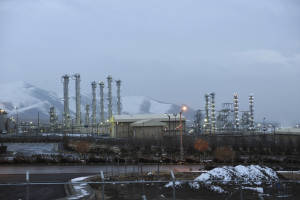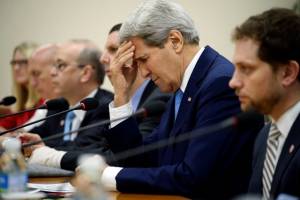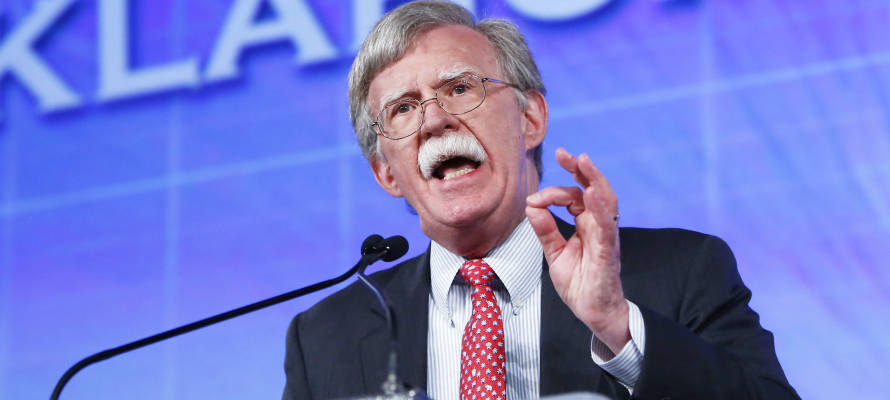Former US ambassador to the US John Bolton explains the pending bad Iran nuclear deal and how close Iran is to creating deliverable nuclear weapons.
The setting was informal on a recent Sunday afternoon in New York City: a small-but-dry room providing a haven during a Central Park downpour that followed the Celebrate Israel Parade. But the large crowd and the weather outside were far from the mind of John Bolton, the former U.S. ambassador to the United Nations.
Instead, the vocal supporter of Israel and former official in the Ronald Reagan and George W. Bush administrations honed in on a different kind of storm.
“My focus is on the threat of a nuclear Iran and how close it is to creating deliverable nuclear weapons,” Bolton said in an interview with JNS.org. “That, and how serious the threat of a nuclear Iran is to Israel and the United States.”

ran’s heavy water nuclear facility is backdropped by mountains near the central city of Arak. (AP/ISNA, Hamid Foroutan, File)
Bolton, who more than a decade ago testified before Congress that Iran was lying about enriched uranium contamination, laid out what he considers essential components of an acceptable nuclear agreement between world powers and the Islamic Republic, saying that “any facility that we believe is associated with the nuclear program must be subject to inspection.”
“The current negotiations with Iran are inherently flawed,” said Bolton. “Congress is not strong enough. Even the recent legislation [giving Congress 30 days to review a nuclear deal] allows Congress to do what it already had the power to do.”
In advance of the June 30 deadline for Iran and the P5+1 nations to reach a nuclear deal,“no notice” inspections of nuclear sites, as well as any inspections of military sites, have been refused by Iranian Supreme Leader Ayatollah Ali Khamenei.
“There is no deal that [Iran] will accept that will be acceptable to us… believing the [emerging deal] will be subject to verification is delusional,” Bolton said, who argued that the demand for inspections must extended to Iran’s ballistic missile program.
“If you can’t judge components, you can’t have faith that the deal will be sustained,” he said.
About three weeks later, on June 22, Bolton was the keynote speaker for an event of American Friends of Ateret Cohanim, the U.S. arm of an Israeli organization that works to create Jewish majorities in Arab-heavy neighborhoods of Jerusalem. Not surprisingly, Bolton—the man who during his time as America’s U.N. envoy spearheaded the process leading to the U.N.’s repeal of its infamous “Zionism is Racism” resolution—was received warmly by the audience. His address focused on what he called “two looming problems”—the “need for the Jewish people to regard Israel as a homeland with Jerusalem as its capital,” and the pending nuclear deal with Iran.
In the earlier interview, Bolton sid that the “idea that, at the present time, Israel and the representatives of the so-called ‘Palestinian people’ will create a territorial boundary” is “delusional,” noting that the Middle East and North Africa are “slipping into chaos; state structures are disappearing in almost every country.”
Aside from the turmoil in Algeria, Mali, Libya, and Nigeria, the Egyptian army is losing control of the Sinai Peninsula, and Yemen “is now the headquarters of both Al-Qaeda and has a growing ISIS (Islamic State terror group) presence,” Bolton warned.
“The state of Iraq does not exist, and the Kurds will never be brought back into Iraq,” said Bolton, adding, “I don’t think the state of Syria exists” in a particularly grim prognosis on both the rise of Islamic State and the Syrian civil war.

US Secretary of State John Kerry. (AP/Ed Jones)
Bolton expressed sympathy for Israel’s neighbor of Jordan—a country he said is “under the greatest pressure”—rhetorically asking, “And people want to create another state? A state of Palestine would be ultimately vulnerable to takeover by radical Islam… the greatest threat ever, both to Israel and the United States.”
Turning back to Iran’s nuclear program, Bolton said, “We are on the verge of what could be the most divisive, disturbing position in 1,000 years: that is, the spread of nuclear weapons, having religious fascists with nuclear weapons.” He said that signing an agreement with Iran, the world’s leading state sponsor of terrorism, is “contrary to United States’s policy that we do not negotiate with terrorists.”
“It will give the [Iranian] regime legitimacy. It will legitimize its nuclear program,” Bolton said.
“It gets more depressing by the day,” he added, saying that an extension of the June 30 nuclear deadline “will simply allow this already abominable deal to get even worse.”
Bolton fears that if President Barack Obama signs a deal with Iran that lifts sanctions against the Islamic Republic, “other countries will do the same” and will not support new sanctions if Iran fails to abide by the pact.
“There’s no agreement on how to bring back sanctions,” he said. “If Iran is in violation, sanctions will be difficult to reimpose.”
If not a diplomatic deal, JNS.org asked Bolton, then what alternative measures should be taken to prevent Iranian nuclear weapons?
“None of the Arab monarchs have the capacity to destroy Iran’s control of nuclear fuel cycles,” Bolton said, in reference to nations like Saudi Arabia who share Israel’s concern about Iran. “If the United States or Israel strikes before Iran gets nuclear, the Arabs will passively support the action. There is interest. All kinds of cooperation are possible.”
Bolton predicts that Iran will have scores of nuclear weapons within 20 months.
“It’s a tough decision, but Israel must strike,” he said. “Once Iran gets nuclear, any attack will risk nuclear retaliation.”
Israel, Bolton said, “will need political support and a firm American position recognizing that an attack will be within Israel’s legitimate rights of self-defense. Any attack must be done very promptly: Iran is likely to unleash Hezbollah and Hamas (two terrorist groups it funds).”
Concluding his June 22 comments before the American Friends of Ateret Cohanim, event, Bolton stressed that the people of the Jewish state must “continue to do what is perfectly natural in the land of Israel.” He called the current political tension between Obama and Israeli Prime Minister Benjamin Netanyahu “an aberration” in U.S.-Israel relations, and said that “the people of the United States, whatever their faith, will support Israel overwhelmingly in its right of self-defense.”
“Israel,” said Bolton, “must not be intimidated by propaganda.”
By: Maxine Dovere/JNS.org
